
We at EWQ want to be a pioneer company in responsibility, which is why we make our subcontracting chain to commit to our Code of Conduct principles. Responsibility is therefore the most important criterion in the selection of our subcontractors. We always ensure the corporate responsibility of our subcontractors and require companies to sign our corporate responsibility principles before starting cooperation with them. We give our partners the opportunity to improve their processes if any shortcomings in terms of responsibility are found, in which case we also influence the responsibility and attitude of our partners. We will terminate our partnership agreement if the shortcomings are not addressed.
Purpose
All responsibility starts from the fact that the company itself creates and records its own principles as a clear document, on the basis of which the basis for responsibility processes in the company are created. It is therefore the foundation on which companies build their responsibility. We ensure that we do not cooperate with companies in the gray area and that at least the UN principles of responsibility are respected, including human rights, and that the employees of our subcontractors are organized.

Results
Our subcontractors have taken responsibility seriously and several of the companies that have signed our Code of Conduct have themselves begun to pay more attention to responsibility. We currently have 14 signed partners and we are in discussions with two new ones. All of our subcontractors have therefore signed a contract.

Implementation
The Code of Conduct contains the principles of our responsibility, to which all our partners are bound by signatures. The document outlines the cornerstones and principles of our corporate and social responsibility, including working conditions for employees, compliance with UN human rights principles, equality, zero tolerance for discrimination, accidents, data protection principles, carbon offsets and factors affecting climate change. Our partners have signed the document and are committed to the same principles. Monitoring is based on the fact that we do not use any of so-called low-cost subcontracting countries and that our chain is almost entirely domestic.
For the most part our current partners have been our subcontractors for over 10 years. When a new partner starts working with us, we do an accurate screening of them (DD contract), and if it is something more than a case of an installation team of few people, etc., monitoring is largely based on how the subcontractor’s parts and products are transported and packaged. In addition, we study where the parts come from and how the products can be recycled. If deficiencies occur, we will notify the subcontractor immediately and request a change based on the signed Code of Conduct agreement. If no change is made, we will start negotiations with a new subcontractor and ultimately change the subcontractor if the first subcontractor does not change its processes more responsible.
Developing supply chain and vendor requirements for sustainability and setting up a follow-up and improvement process requires dedicated effort and management commitment. This act is highly scalable and is already a widely used practice across many industries with larger companies. This Planet Act shows that also SMEs can implement sustainability requirements to their supply chains.



Responses